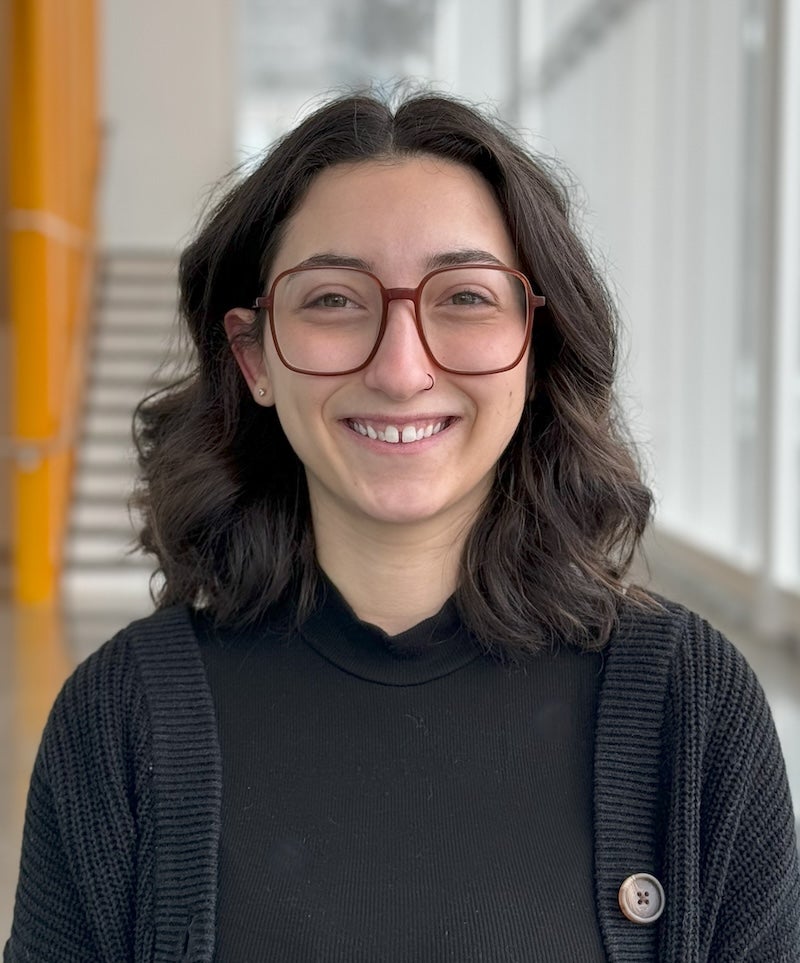Emma Ventura, a senior in environmental science and management, worked with the URI Cooperative Extension’s Vegetable Production Program, collaborating with Dr. David Weisberger. a crop scientist and Extension agent. He is spearheading a project focused on researching and documenting innovative, sustainable, and efficient farming practices for small farms in the state, and Emma played a critical role by providing outreach and educational support through video content and social media.
Q. What did your fellowship work entail?
A. I was lucky enough to have the opportunity to work on a lot of different projects and with a lot of new people through my fellowship. My main project was a farmer documentary series funded by the speciality crop block grant at Shewatuck Farm. The project had two goals: to support our four featured farmers in attempting a novel practice and to create a publicly available resource for other RI farmers. The farms we worked with were Shewatuck Farm, Little River Farm, Luckyfoot Ranch, and Chris and Kristina’s Market Garden. Each of our featured farmers was asked to select a novel farming practice that they were interested in trying and was either more regenerative and/ or more efficient for them. They choose multiple methods of cover cropping, on-farm composting, and plastic mulching. Then, throughout the growing season, our videographer, Jeff Matteis, and I visited each farm multiple times to check on their progress and offer support. Some of my responsibilities included writing interview questions, interviewing participants, and photographing their progress. Our team then collaborated, and the footage was cut into four short documentaries for public use.
Another project that I was able to work with was the URI Boots to Bushels. B2B is a market garden training program meant for veterans and anyone looking to get into farming for the first time. 2024 was the first year the program was hosted by our University, and I was able to work with program director, Tricia Lourenco Boucher, to perform an evaluation of participant satisfaction through a series of participant interviews. I interviewed program participants and then analyzed their answers for future use. Along with satisfaction, my research also aimed to determine how working in agriculture affected veterans’ mental and physical health.
What was the most fulfilling part about doing the AFS Fellowship Program?
One of the most fulfilling parts of the AFS Fellowship Program was the relationships I formed. My placement allowed me to meet and work with so many amazing farmers here at the University and across the state. I am so grateful to have had the opportunity to be welcomed into the Rhode Island farming community. The other fellows and I also spent so much time together throughout the past year and I am happy to have gotten a chance to know all of them.
How did this hands-on experience enrich your academic experience?
A fellowship is a great way to enrich academic experience. This fellowship helped me take a lot of what I was learning in class and put it into practice. Sometimes it can feel like there is a disconnect between what is taught in classes and what employers are looking for in candidates. My fellowship helped bridge the gap between academics and application.
For folks who are not scientists but would benefit from understanding the work that you did for the Fellowship, what are some main “takeaways” you’d share with them?
Agriculture can be an incredibly difficult industry; the hours are long, and the work is demanding. That being said, the farmers I got a chance to work with this summer are some of the most passionate people I have ever met in my life. Their connection with the land and community is deep, and many find a sense of purpose in providing for both. What my fellowship aimed to improve was making farming more environmentally friendly, efficient, and accessible. Locally and sustainably sourced food is an admirable goal, but to achieve this, we have to first take care of the people who provide it for us.
What advice do you have for students who want to do a fellowship?
Starting a fellowship is a great way to gain professional experience. My advice would be to ask questions! When starting to apply for this fellowship, I felt intimidated and wasn’t sure where to start. I got a chance to talk with the program coordinators and my advisor, and they were able to help me through the process. The only way to find out if this is right for you is by asking questions and starting the conversation.
How do you think this experience will help you in the future?
This fellowship has given me many opportunities to make professional connections and gain experience in a wide variety of situations. I’ve gained confidence in my professional skills and public speaking on top of the industry skills I gained in my placement.
Anything else you’d like to share?
I transferred from CCRI to URI in the fall of 2023. I didn’t know about this program at the time, but the AFS fellowship is open to both URI and CCRI students. I think this could be a great opportunity for anyone looking to or recently transferring from CCRI. The AFS fellowship program helped me get involved in campus life.

